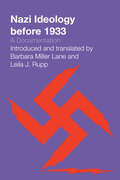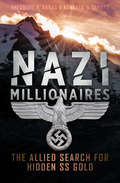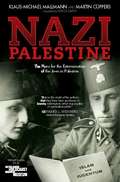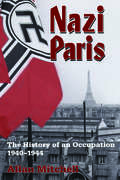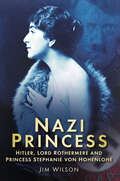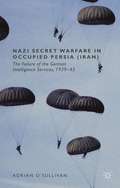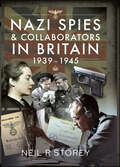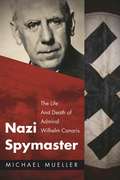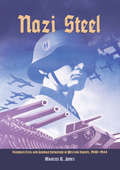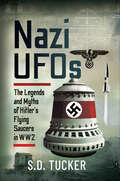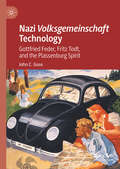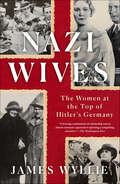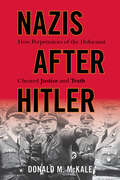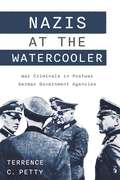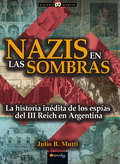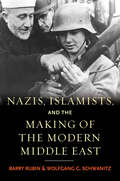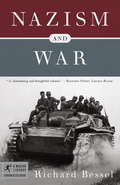- Table View
- List View
Nazi Ideology before 1933: A Documentation
by Barbara Miller LaneThis collection of early writings by leading Nazi intellectuals sheds light on the evolution of Nazi political thought as the party came to power. Barbara Miller Lane and Leila J. Rupp bring together a crucial yet hitherto inaccessible body of material that thoroughly chronicles Nazi ideology before 1933. It includes the extensive writings and programs published by Dietrich Eckart, Alfred Rosenberg, Gottfried Feder, Joseph Goebbels, Gregor and Otto Strasser, Heinrich Himmler, and Richard Walther Darré. Hitler&’s role in the development of Nazi ideology, interpreted here as a very permissive one, is thoroughly assessed. In commentary by the editors, the significance of each Nazi theorist is evaluated at each stage of the history of the party. Lane and Rupp conclude that early Nazi ideology was not a consistent whole but a doctrine in the process of rapid development to which new ideas were continually introduced. By the time the Nazis came to power, however, a group of interrelated assertions and official promises had been made to party followers and to the public. Hitler and the Third Reich had to accommodate this ideology, even when not implementing it. Each selection is accompanied by an introductory note and annotations which clarify its relationship to other works of the author and other writings of the period. Also included are original translations of the &“Twenty-Five Points&” and a number of little-known official party statements.
Nazi Ideology before 1933: A Documentation
by Barbara Miller LaneThis collection of early writings by leading Nazi intellectuals sheds light on the evolution of Nazi political thought as the party came to power. Barbara Miller Lane and Leila J. Rupp bring together a crucial yet hitherto inaccessible body of material that thoroughly chronicles Nazi ideology before 1933. It includes the extensive writings and programs published by Dietrich Eckart, Alfred Rosenberg, Gottfried Feder, Joseph Goebbels, Gregor and Otto Strasser, Heinrich Himmler, and Richard Walther Darré. Hitler&’s role in the development of Nazi ideology, interpreted here as a very permissive one, is thoroughly assessed. In commentary by the editors, the significance of each Nazi theorist is evaluated at each stage of the history of the party. Lane and Rupp conclude that early Nazi ideology was not a consistent whole but a doctrine in the process of rapid development to which new ideas were continually introduced. By the time the Nazis came to power, however, a group of interrelated assertions and official promises had been made to party followers and to the public. Hitler and the Third Reich had to accommodate this ideology, even when not implementing it. Each selection is accompanied by an introductory note and annotations which clarify its relationship to other works of the author and other writings of the period. Also included are original translations of the &“Twenty-Five Points&” and a number of little-known official party statements.
Nazi Millionaires: The Allied Search for Hidden SS Gold (World War Ii Ser.)
by Kenneth D. Alford Theodore P. SavasThe untold story of Nazi officers who escaped Germany after WWII with stolen treasure—and the Allied investigation to get it back.During the final days of World War II, German SS officers crammed trains, cars, and trucks full of gold, currency, and jewels, and headed for the mountains of Austria. Most of these men were eventually apprehended, but many managed to evade capture. The intensive postwar Allied investigation that followed recovered only a sliver of their treasure. The true story of the men who escaped, and the riches that went missing, is finally revealed in Nazi Millionaires.This groundbreaking study, based on previously unpublished and newly declassified documents, offers insight into the minds and methods of these SS thieves. Readers are taken inside the Reich Security Main Office where they worked and the Allied investigation into their activities to discover what happened to the vast wealth they looted from Europe’s Jews. Nazi Millionaires tells a remarkable tale of greed, fraud, treachery, and murder.
Nazi Palestine
by Krista Smith Martin Cüppers Klaus-Michael Mallmann"It is to the credit of the two authors of this book . . . that they have been assiduous in locating information either inaccessible or overlooked earlier."-Gerhard L. WeinbergThe planned extermination of the Jews living in Palestine was only weeks away . . .In 1941-42 Nazi Germany appeared to be invincible in North Africa, and many Arab nationalists looked to a leader, the Grand Mufti of Jerusalem, Haj Amin el-Husseini, for guidance.The Mufti had several meetings with Adolf Hitler. Nazi Germany also pledged to wipe out the Jews who had been living in Palestine since time immemorial as well as the new arrivals from the beginning of the modern Zionist movement in the nineteenth century and following the Balfour Declaration in 1917.A special unit was assembled and trained in Greece in the spring of 1942 by SD officer Walter Rauff, the originator of the gassing van experiments in Poland and the Soviet Union. They were to operate behind the lines with the help of those in the region who were eager to join the task force. After El Alamein, the Einsatzkommando shifted its operations to Tunisia, where it implemented cruel anti-Jewish policies for many months.Over 2,500 Tunisian Jews were to die in the camps set up by the Nazis and their collaborators.The authors have identified the relevant documents and analyzed the racist, ideological, political, and religious implications of the planning of a specific regional extermination program within the context of the Holocaust.
Nazi Paris
by Allan MitchellBasing his extensive research into hitherto unexploited archival documentation on both sides of the Rhine, Allan Mitchell has uncovered the inner workings of the German military regime from the Wehrmacht's triumphal entry into Paris in June 1940 to its ignominious withdrawal in August 1944. Although mindful of the French experience and the fundamental issue of collaboration, the author concentrates on the complex problems of occupying a foreign territory after a surprisingly swift conquest. By exploring in detail such topics as the regulation of public comportment, economic policy, forced labor, culture and propaganda, police activity, persecution and deportation of Jews, assassinations, executions, and torture, this study supersedes earlier attempts to investigate the German domination and exploitation of wartime France. In doing so, these findings provide an invaluable complement to the work of scholars who have viewed those dark years exclusively or mainly from the French perspective.
Nazi Plunder: Great Treasure Stories Of World War II
by Kenneth D. AlfordWorld War II was the most devastating conflict in human history, but the tragedy did not end on the battlefields. During the war, Germany--and, later, the Allies--plundered Europe's historic treasures. Between 1939 and 1945, German armed forces roamed from Dunkirk to Stalingrad, looting gold, silver, currency, paintings and other works of art, coins, religious artifacts, and millions of books and other documents. The value of these items, many of which were irreplaceable, is estimated in the billions of dollars. The artwork alone, looted under Hitler's direction, exceeded the combined collections of the Metropolitan Museum, the British Museum, and the Louvre. As the war wound to its conclusion in 1945, occupying forces continued the looting. The story of these celebrated works of art and other vanished treasures--and the mystery of where they went--is a remarkable tale of greed, fraud, deceit, and treachery. Kenneth Alford's Nazi Plunder is the latest word on this fascinating subject.
Nazi Princess: Hitler, Lord Rothermere and Princess Stephanie von Hohenlohe
by Jim WilsonNazi Princess
Nazi Prisons in the British Isles: Political Prisoners during the German Occupation of Jersey and Guernsey, 1940–1945 (Modern Conflict Archaeology)
by Gilly CarrWith firsthand sources and archeological research, this study explores life inside Nazi prisons during the occupation of the Channel Islands.Through most of the Second World War, Nazis occupied the Bailiwicks of Jersey and Guernsey, two British Crown dependencies in the English Channel. With extensive research, archeologist Gilly Carr has uncovered the enduring legacies of this occupation. In Nazi Prisons in Britain, she shines a light on the lives of citizen resisters who became political prisoners on their own soil. Carr explores political prisoner consciousness and solidarity through the letters of the “Jersey 21” and the diaries of Frank Falla, Guernsey’s best-known resister. Drawing on memoirs, poetry, graffiti, official archives, and material culture—as well as the words of war criminals, traitors, surrealist artists, and many others—she reveals what life was like inside these brutal Nazi prisons.
Nazi Propaganda for the Arab World
by Jeffrey HerfJeffrey Herf, a leading scholar in the field, offers the most extensive examination to date of Nazi propaganda activities targeting Arabs and Muslims in the Middle East during World War II and the Holocaust. He draws extensively on previously unused and little-known archival resources, including the shocking transcriptions of the "Axis Broadcasts in Arabic" radio programs, which convey a strongly anti-Semitic message. Herf explores the intellectual, political, and cultural context in which German and European radical anti-Semitism was found to resonate with similar views rooted in a selective appropriation of the traditions of Islam. Pro-Nazi Arab exiles in wartime Berlin, including Haj el-Husseini and Rashid el-Kilani, collaborated with the Nazis in constructing their Middle East propaganda campaign. By integrating the political and military history of the war in the Middle East with the intellectual and cultural dimensions of the propagandistic diffusion of Nazi ideology, Herf offers the most thorough examination to date of this important chapter in the history of World War II. Importantly, he also shows how the anti-Semitism promoted by the Nazi propaganda effort contributed to the anti-Semitism exhibited by adherents of radical forms of Islam in the Middle East today.
Nazi Science: Myth, Truth, And The German Atomic Bomb
by Mark WalkerIn this book, Mark Walker - a historical scholar of Nazi science - brings to light the overwhelming impact of Hitler's regime on science and, ultimately, on the pursuit of the German atomic bomb. Walker meticulously draws on hundreds of original documents to examine the role of German scientists in the rise and fall of the Third Reich. He investigates whether most German scientists during Hitler's regime enthusiastically embraced the tenets of National Socialism or cooperated in a Faustian pact for financial support, which contributed to National Socialism's running rampant and culminated in the rape of Europe and the genocide of millions of Jews. This work unravels the myths and controversies surrounding Hitler's atomic bomb project. It provides a look at what surprisingly turned out to be an Achilles' heel for Hitler - the misuse of science and scientists in the service of the Third Reich.
Nazi Secret Warfare in Occupied Persia (Iran)
by Adrian O’sullivanThis is the first full-length work to be published about the spectacular failure of the German intelligence services in Persia (Iran) during WWII. Based on archival research it analyzes a compelling history of Nazi planning, operations, personalities, and intrigues, and follows the protagonists from Hitler's rise to power into the postwar era.
Nazi Spies & Collaborators in Britain, 1939–1945
by Neil R. Storey"...reveals the climate of fear along with the identities and case studies of suspected collaborators in key invasion areas." —ARGunners.comThe true extent of Nazi secret agent activity in Britain during the Second World War has received little attention. In large part this is due to the highly classified nature of the subject. This fascinating book uses recently released documents to explore how German agents penetrated our borders and explains methods of agent recruitment. Some spies were arrested and handed over the MI5 for interrogation. Several were turned and became ‘double-cross’ agents, while others were tried and executed or incarcerated in Camp 020 and other facilities. There were also those who came and left undetected and were only revealed after Nazi records were seized. The story, however, does not end there. While British authorities urged the public to beware of spies and posters warned ‘careless talk costs lives,’ the actual existence of Nazi collaborators in Britain was played down. Author Neil R Storey’s discovery of MI5’s and Regional Security Panels’ ‘Black Lists’ of those considered to be ‘likely to assist the enemy’ in the event of invasion reveals the climate of fear along with the identities and case studies of suspected Nazi collaborators in key invasion areas. This book is a gripping exposé of the very real threat posed by Nazi undercover operatives and collaborators in Britain during the Second World War.
Nazi Spymaster: The Life and Death of Admiral Wilhelm Canaris
by Gerhard L. Weinberg Michael MuellerAdmiral Wilhelm Canaris was the head of the Abwehr?Hitler's intelligence service?from 1935 to 1944. Initially a supporter of Hitler, Canaris came to vigorously oppose his policies and practices and worked secretly throughout the war to overthrow the regime. Near the end of the war, secret documents were discovered that implicated Canaris and hinted at the extent of the activities conducted by Canaris's Abwehr against the Hitler regime, and in 1945 Canaris was executed as a national traitor. But Canaris left little in the way of personal documents, and to this day he remains a figure shrouded in mystery. Drawing on newly available archival materials, Mueller investigates the double life of this legendary and enigmatic figure in the first major biography of Canaris to be published in German.
Nazi Steel
by Marcus O. JonesThis study explores an exemplary instance of the close interaction between private and official interests in planning and executing the programs of the Nazi government, namely the acquisition in 1941 of the Rombach steel works by the German industrialist Friedrich Flick. The industrial concern headed by Flick was among the largest and most influential steel producers and manufacturers of war material in the German economy during World War II. Its activities in the occupied territories of western Europe centered on control of the Rombach works, a large operation established in Lorraine in the late nineteenth-century by German industrialists and expropriated by France, along with the entire region, in the aftermath of the First World War. After successful military operations against France in 1940, the Nazi regime actively sought the collusion of the German industrial community in mobilizing the productive capacity of occupied territories for the war effort, and numerous private German businessmen advanced claims on the lucrative assets in Lorraine and adjacent regions. In his bid to gain control of the Rombach works, Flick was successful for reasons specific to his position within the Nazi German economic system and the character of his interests. This account of his activities, then, serves as a fine example of Nazi economic and occupation policy and its response to party, business, and bureaucratic influences.
Nazi UFOs: The Legends and Myths of Hitler's Flying Saucers in WW2
by S.D. TuckerNazi UFOs tells the strange tale of how, following the first alleged flying saucer sightings made in the USA in 1947, a series of fantasists and neo-fascists came forward to create a media myth that the Nazis may have invented these incredible craft as a means for winning the Second World War, a plan which was tantalisingly close to completion before the Allies conquered Berlin in 1945. Today, the fantasy of Nazi UFOs has grown into an entire mythology in books, on TV and online. Did Germany back-engineer anti-gravity craft, and even a full-blown time-machine, by stripping technology from a crashed alien saucer? Did the SS secretly invent ‘Green’ technology for use in their star ship engines, and was this planet-saving discovery later suppressed at the behest of a sinister Big Oil conspiracy? Did Himmler try to develop ‘lightning weapons’ for use in aerial combat? By contrasting the fake military-industrial pseudo-histories of Nazi UFO theorists with details of real-life Nazi aerospace achievements, the author demonstrates both how this modern-day mythology came about and how it cannot possibly be more than fractionally true. For the first time, this fake ‘alternative military history’ is laid out in full. This book features an appealing cast of con-men and spies, complete madmen, real-life Nazis and completely made-up ones, operating right across the globe from South America to wartime Europe and Japan. A good example may be the ‘mad professor’, Viktor Schauberger, who actually genuinely did manage to gain a personal audience with Adolf Hitler in order to try and convince him that he had discovered and then exploited some amazing new source of natural ‘free energy’ which could make objects (such as saucers, in the opinion of some) float. Hitler dismissed his plan, but it does nonetheless show how close some bizarre schemes came to being implemented in Nazi Germany.
Nazi Volksgemeinschaft Technology: Gottfrried Feder, Fritz Todt, and the Plassenburg Spirit
by John C. GuseThis book traces how Gottfried Feder and Fritz Todt made technology essential to the Nazi ‘world view’. They groomed engineers with a racist technical ideology that prepared them to later supervise slave labor and the Holocaust. Their concepts evolved from völkisch technocracy to an idealized harmony of man, machine and nature, and were eclipsed by Albert Speer’s total war. Partially due to willing ‘self-coordination’ from engineers, they gained political control over the engineering profession. Destined to be pillars of the Volksgemeinschaft, engineers were indoctrinated with Nazi principles of Aryan superiority at the Reich School of Technology, the Plassenburg. Nazi propaganda announced a bright future through technology, furthering a sense of normalcy in Germany, despite the ruthless exclusion of those unwanted.
Nazi War Crimes, US Intelligence and Selective Prosecution at Nuremberg: Controversies Regarding the Role of the Office of Strategic Services
by Michael SalterReviewing recently declassified CIA documents, this book provides a balanced but critical discussion of the contribution of American intelligence officials to the Nuremberg war crimes trials. Giving new details of how senior Nazi war criminals, such as SS General Karl Wolff, were provided with effective immunity deals, partly as a reward for their wartime cooperation with US intelligence officials, including Allen Dulles, former CIA Director, the author also discusses the role of such officials in mobilizing the unique resources of a modern intelligence agency to provide important trial testimony and vital documentary evidence. Nazi War Crimes, US Intelligence and Selective Prosecution at Nuremberg argues that both war crimes prosecutors and intelligence officials can engage in mutually beneficial collaborations, but that both sides need to recognize and appreciate the problems that may arise from the fact that these institutions are required to operate according to different, and in some cases contradictory, agendas. This topical book gives those studying, or with interests in, international law, criminal law and history an insight into the debates surrounding international war crimes, within the context of the Nuremberg war crimes trials.
Nazi Wives: The Women at the Top of Hitler's Germany
by James WyllieAn in-depth look at the personal lives, psychological profiles, and marriages of the wives of officers in Hitler’s inner circle: “Compelling.” —The Washington PostGoering, Goebbels, Himmler, Heydrich, Hess, Bormann—names synonymous with power and influence in the Third Reich. Perhaps less familiar are Carin, Emmy, Magda, Margaret, Lina, Ilse, and Gerda.These are the women behind the infamous men—complex individuals with distinctive personalities who were captivated by Hitler and whose everyday lives were governed by Nazi ideology. Throughout the rise and fall of Nazism these women loved and lost, raised families and quarreled with their husbands and each other, all the while jostling for position with the Fuhrer himself. Until now, they have been treated as minor characters, their significance ignored, as if they were unaware of their husbands’ murderous acts, despite the evidence that was all around them: the stolen art on their walls, the slave labor in their homes, and the produce grown in concentration camps on their tables.James Wyllie’s Nazi Wives explores these women in detail for the first time, skillfully interweaving their stories through years of struggle, power, decline, and destruction into the post-war twilight of denial and delusion.“A chilling and richly detailed group portrait of the women who married Third Reich leaders.” —Publishers Weekly
Nazi and Holocaust Representations in Anglo-American Popular Culture, 1945–2020: Irreverent Remembrance (Palgrave Studies in Cultural Heritage and Conflict)
by Jeffrey DemskyThis book analyzes sensationalized Nazi and Holocaust representations in Anglo-American cultural and political discourses. Recognizing that this history is increasingly removed from contemporary life, it explains how irreverent representations can help rejuvenate the story for successive generations of new learners. Surveying seventy-five-years of transatlantic activities, the work erects counterposing categorizes of “constructive and destructive memorializing,” providing scholars with a new framework for elucidating both this history and its historicization.
Nazis after Hitler: How Perpetrators of the Holocaust Cheated Justice and Truth
by Donald M McKaleThe stories of thirty war criminals who escaped accountability, from a historian praised for his &“well written, scrupulously researched&” work (The New York Times). This deeply researched book traces the biographies of thirty &“typical&” perpetrators of the Holocaust—some well-known, some obscure—who survived World War II. Donald M. McKale reveals the shocking reality that the perpetrators were rarely, if ever, tried or punished for their crimes, and nearly all alleged their innocence in Germany&’s extermination of nearly six million European Jews. He highlights the bitter contrasts between the comfortable postwar lives of many war criminals and the enduring suffering of their victims, and how, in the face of exhaustive evidence showing their culpability, nearly all claimed ignorance of what was going on—and insisted they had done nothing wrong. &“McKale ends the book with a haunting question: whether life would be different today if the Allies had pursued Holocaust criminals more aggressively after WWII. History buffs and students of the Holocaust will be fascinated.&” ―Publishers Weekly &“Gripping and important reading.&” —Eric A. Johnson, author of What We Knew
Nazis at the Watercooler: War Criminals in Postwar German Government Agencies
by Terrence PettyAfter World War II, when a new German democracy was born in the western region of the vanquished Third Reich, tens of thousands of civil servants were hired to work for newly formed government agencies to get the new republic quickly on its feet. But there was an enormous flaw in the plan: no serious vetting system was put in place to keep war criminals out of government positions. Ex-Nazis—people who had been involved in mass murder, drafting antisemitic laws, and the persecution of Hitler&’s opponents, as well as other depravities—resumed their careers without consequence in the newly created Federal Republic of Germany. Former Nazis who had established an early foothold in postwar government agencies helped each other get government work by writing letters of recommendation called Persilscheine. These &“Persil Certificates,&” named after a popular detergent, made an ex-Nazi&’s recorded past just as clean as fresh laundry, and a whole generation of German government officials with Nazi pasts was never brought to account. Ex-Nazis were given preference for government jobs even over victims of Nazi policies and anti-Hitler resisters. They swapped Nazi uniforms for suits, Hitler salutes for handshakes. And with help from the highest levels of West German government and even the CIA, they swept their crimes under the carpet and resurrected their careers. Nazis at the Watercooler illuminates the network of ex–Third Reich loyalists and the U.S. government&’s complicity that enabled this mass impunity.
Nazis en las sombras (Historia Incógnita)
by Julio B. MuttiArgentina fue un hervidero de espías nazis durante la Segunda Guerra Mundial. Estaban en todos los estamentos y vinculados estrechamente con las altas esferas luchando por el control estratégico de Sudamérica. La historia de estos espías, sin embargo, no ha sido revelada hasta ahora. “Nazis en las sombras” desvela la historia documentada y nunca antes narrada de las redes de espionaje nazis en Argentina durante la Segunda Guerra Mundial. Su verdadero alcance, tamaño, objetivos y actividades clandestinas. Es sabido que la Argentina fue el último puente con Occidente de la Alemania nazi. Sin embargo, la historia en las sombras de los más de ciento cincuenta espías que apuntalaron aquella situación a permanecido oculta, a medio narrar o simplemente desconocida por más de setenta años. Las presentes páginas harán recorrer al lector la extensa geografía argentina. Desde la sureña Santa Cruz hasta el norte más árido, los alemanes expandieron sus redes de información y estaciones clandestinas de radiotelegrafía. Chacras misteriosas, dobles agentes y desembarcos clandestinos en playas desoladas llevaran el relato a su punto culminante. Las relaciones y pactos secretos de los espías nazis con el poder gobernante de los años cuarenta no pueden ser eludidos. Salvoconductos secretos, utilización de la información de espionaje y hasta acuerdos de alta política entre naciones sudamericanas aparecerán evidenciados en el transcurso de la presente investigación.
Nazis, Islamists, and the Making of the Modern Middle East
by Barry Rubin Wolfgang G. SchwanitzA groundbreaking account of the Nazi-Islamist alliance that changed the course of World War II and influences the Arab world to this day.During the 1930s and 1940s, a unique and lasting political alliance was forged among Third Reich leaders, Arab nationalists, and Muslim religious authorities. From this relationship sprang a series of dramatic events that, despite their profound impact on the course of World War II, remained secret until now. In this groundbreaking book, esteemed Middle East scholars Barry Rubin and Wolfgang G. Schwanitz uncover for the first time the complete story of this dangerous alliance and explore its continuing impact on Arab politics in the twenty-first century.Rubin and Schwanitz reveal, for example, the full scope of Palestinian leader Amin al-Husaini’s support of Hitler’s genocidal plans against European and Middle Eastern Jews. In addition, they expose the extent of Germany’s long-term promotion of Islamism and jihad. Drawing on unprecedented research in European, American, and Middle East archives, many recently opened and never before written about, the authors offer new insight on the intertwined development of Nazism and Islamism and its impact on the modern Middle East.“[Nazis, Islamists] reinsert[s] racial ideology into the study of the desert conflict and thereby offer[s] new insights into the Nazis’ relationships with their North African and Middle Eastern partners.” —Mia Lee, Contemporary European History“Thoroughly researched and closely argued.” —David Pryce-Jones, National Review“The odd-couple marriage between Nazis and Arab nationalists has come under increasingly revealing scrutiny over the last decade. Here, fresh research from previously unexamined archives explicitly ties that frightening nexus to today’s Middle East.”—Gene Santoro, World War II magazine“This book tells a remarkable and–to me at least–little known but very important story.” —Marshall Poe, New Books in History
Nazism and War
by Richard BesselA chilling and powerful account of the rise and fall of the Nazis, emphasising their beliefs in race and war which produced the most terrible killing frenzy in the history of humanityAs this book shows, Nazi ideology was based on two central beliefs: in war and race. Peace was merely a preparation for war, war which would redraw the racial map of Europe. The author begins with the aftermath of the First World War and the corrosive myth-building which substituted memories of senseless slaughter with the myth of a meaningful and even sacred event. It moves on steadily through the 1920s and the Nazi seizure of power, to the economic boom, massive rearmament and government-sponsored anti-Semitism of the 1930s. And then on to the war itself and the Nazis' racist war of extermination.The author pays particular attention to the chaos and extreme violence of the last months of the war, so catastrophic for the German people that they came to believe that they too had been victims of the war. Finally he describes the aftermath of the Second World War and the wreckage left behind by the Nazis which affected the lives of Germans and Europeans far beyond May 1945.
Nazism and War (Modern Library Chronicles #20)
by Richard BesselThe Second World War was the defining event of the twentieth century, leaving millions dead and redrawing the political map in ways that continue to affect nearly the entire human race. What was unprecedented, however, was not simply the war’s scale, but its causes. Unlike previous territorial or political clashes, the war launched by Nazi Germany was an ideological one, waged to wipe entire peoples and cultures from the face of the earth. InNazism and War,Richard Bessel, one of the preeminent authorities on the social and political history of modern Germany, demonstrates how racial hatred was the driving force behind–and not a by-product of–Nazism. War was the anvil on which Hitler’s worldview was forged; to him, war was “the most memorable period of my life,” and “all the past fell away into oblivion. ” German National Socialism was born in war, emerging triumphant over a country deeply scarred by defeat and eager to reclaim its greatness and to punish those who had usurped it. As a political philosophy, Nazism glorified struggle and conflict, viewing them as the purpose of a nation and a measure of its overall condition. As a political movement and state system, Nazism made its ideology real, plunging the European continent into a war of annihilation and a sea of blood. Nazism–inseparable from war–destroyed the old Europe, and thus helped to create the world in which we live. Incisive, authoritative, and immensely readable, this is an incendiary and forcefully argued work of scholarship that will rank with the most influential historical analyses of our time. From the Hardcover edition.
